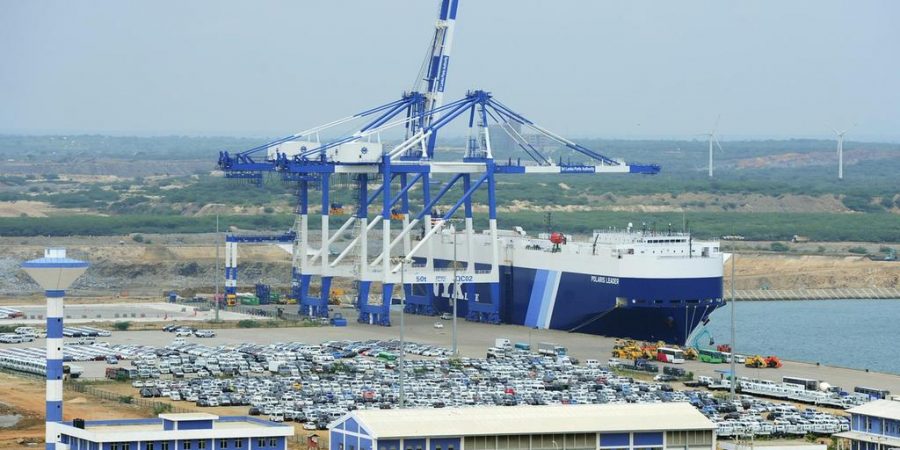However, Beijing has only one overseas military base for the People’s Liberation Army-Navy, which is located near Doraleh port in Djibouti. The base has been officially operating since August 2017.
Sri Lanka hands over port to China to pay off debt

COLOMBO, (DNA) – Sri Lanka has formally handed control of a strategic port on its southern coast to China as part of a 99-year lease agreement.
Under a US$1.1 billion (Dh4bn) deal that the Sri Lankan political opposition and trade unions have called a “sell-out” move, Chinese firms now hold a 70 per cent stake in Hambantota port.
The $1.3bn port was built with loans from a Chinese state-owned bank and opened in 2010. But the Sri Lankan government has struggled to repay the debt, with the project incurring heavy losses. Along with loans taken out for other infrastructure development projects, Colombo now owes China a total of $8bn.
“With [the Hambantota port] agreement we have started to pay back the loans,” Sri Lankan prime minster Ranil Wickremesinghe said during a handing-over ceremony in parliament on Saturday. “Hambantota will be converted to a major port in the Indian Ocean”.
He added that the move would lead to economic development and promote tourism. Hambantota sits on one of the world’s busiest marine routes, with much east-west trade passing through the Indian Ocean’s sea lanes, but most ships bypass it and heads for the already well established harbour in Colombo, the Sri Lankan capital.
Chinese firms, under the state-controlled China Merchants Port Holdings company, now hold a majority stake in the port as part of a joint venture with the state-run Sri Lanka Port Authority. The lease agreement, which was signed in July, also includes wide-ranging tax concessions for the port and a 32-year tax break for the Chinese firms. For its part, China has paid Sri Lanka an initial sum of $300 million, with further payments to come, though exactly when is unclear.
International reaction to the port handover has focused on China’s increasing geopolitical ambitions, while locals have voiced fears of a loss of Sri Lankan sovereignty. When the agreement was signed in July, local MP Namal Rajapaksa tweeted: “Government is playing geopolitics with national assets? #stopselling SL”
Also on Twitter, Brahma Chellaney, an Indian author and political analyst, described the deal as “debt-trap diplomacy”, saying Chinese loans are often given in exchange for strategically important physical assets which can be “collateralised”.
For Beijing, its acquisition of Hambantota is part of its longer-term ‘One Belt, One Road’ (OBOR) project. Other OBOR projects include a $10.7b plan to develop the Omani town of Duqm into an industrial city, which will transform the dusty port into a major transit hub. Closer to Hambantota will be Pakistan’s Gwadar port, which Beijing is developing as a key part of the $55bn China-Pakistan Economic Corridor (CPEC).
Along with Sri Lanka China has added the Maldives in the Indian Ocean to its growing sphere of influence, completing a free-trade agreement at the end of November. Hosting Maldivian president Abdulla Yameen in Beijing China’s leader Xi Jinping said, “China deems the Maldives as an important partner to building the 21st Century Maritime Silk Road”. President Yameen, meanwhile, was quoted as saying that China was “among our closest friends, most trusted and most dependable partners”.
Such plans are part of Chinese geopolitical goals that will see Beijing challenging the United States as the world’s pre-eminent maritime power, with some fearing that China may be seeking to use ports such as Hambantota, Duqm and Gwadar as naval bases. In May, Sri Lanka rejected a request from Beijing to dock a submarine at Hambantota.
But China’s rival and neighbour India has ambitious plans of its own. New Delhi is looking to buy a 40-year lease of the mostly unused airport that sits alongside Hambantota port for $300 million. David Brewster, an expert in South Asian strategic affairs at the Australian National University’s National Security College, wrote of this plan: “A key element in any overseas naval base, and even a logistics facility, is easy access by air for people and supplies”.
“In short, India is spending $300m buying an airport to block a Chinese naval base.”
Related News

The 18th Korean Ambassador’s National Junior & Cadet Kyorugi & Poomsae Taekwondo Championships Successfully Held in Rawalpindi
ISLAMABAD, DEC 29 /DNA/: The 18th Korean Ambassador’s National Junior & Cadet Kyorugi & PoomsaeRead More

Pakistan urges UK to act against accounts accused of inciting violence
The move follows Pakistan’s earlier submissions to the British High Commission in Islamabad, where, officialsRead More


Comments are Closed